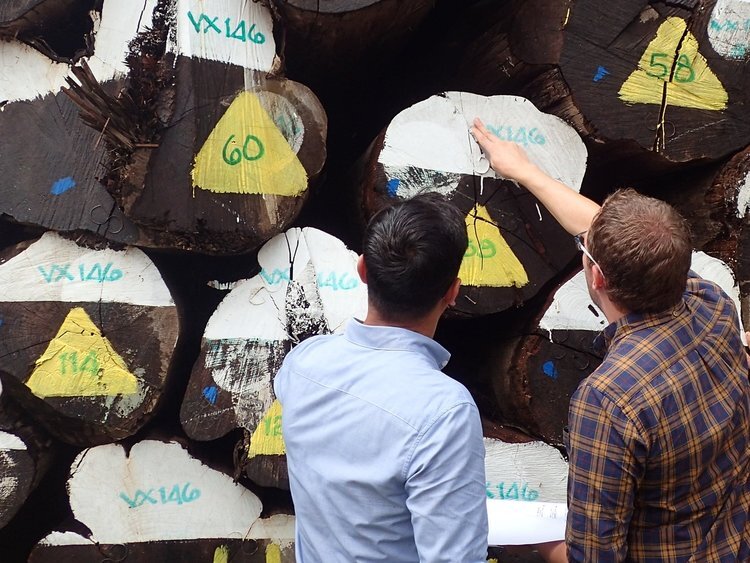This statement has been prepared following publication of the summary record of the EUTR-FLEGT Expert Group meeting of 20 September 2017, and subsequent briefing provided by DoubleHelix at the Timber Regulatory Enforcement Exchange meeting on 23 October 2017. It provides an update of recent activities and a short-term roadmap of activities intended to address concerns raised at these meetings.
DoubleHelix is one of a handful of organisations engaged in Myanmar to find solutions to the serious challenges faced by the timber sector. As a company, we have established a credible reputation through our activities working with timber supply chains in Asia and Africa.

Current activities
Operating in Myanmar is challenging due to its recent emergence from economic sanctions, and the lack of structure and capacity in place to satisfy all requirements expected under an established timber certification system. Whilst there are many improvements to make, DoubleHelix currently routinely conducts the following activities as part of its verification process:
Field visits at downstream (sawmill and warehouse) entities, to assess risk of unknown timber entering the supply chain from forest extraction up to point of export (container sealing). This process is demonstrated through comprehensive Risk Assessment reports for every supply chain, supported by information collected through desk research.
Recommendations of actions required to mitigate risk of unknown timber entering the supply chain, and subsequent checking that those actions have been implemented.
If actions have been implemented, ongoing verification of individual consignments of product, based on monitoring of all log input data and cross reference against upcountry log depot removal and transit documents to verify claims of forest origin issued by Myanmar Timber Enterprise and mitigate against risk of substitution during transport.

Nevertheless, we acknowledge that improvements must be made in the following areas:
Clearer reference to a publically available system of requirements, including the relevant requirements of the applicable legislation.
Field visits to forest areas and upcountry log depots to verify log traceability back to stump and against harvest plans.
SHORT-TERM PLAN
As a Small and Medium Enterprise with limited resources, we appreciate the need to combine our expertise with other organisations and individuals in order to address the above points and satisfy Article 4 of the EUTR Implementing Regulation (EU) No 607/2012. The following short-term actions have been initiated:
With the assistance of key exporters, DoubleHelix now has permission from Myanmar Timber Enterprise and the Forest Department to access upcountry and forest areas for the purposes of third party verification.
DoubleHelix has been working with the Myanmar Forest Certification Committee to support the development, testing and implementation of a Myanmar Timber Legality Assurance System. DoubleHelix is also committed to be accredited against the system when the appropriate structure is put in place. These activities are a pre-cursor to the MFCC-PEFC project to establish an internationally recognized forest certification system. We will continue to support the project through in-kind contributions, providing staff resources and expertise, as part of a long-term partnership.
TRANSPARENCY
We invite interested parties to observe our activities in Myanmar, in order to improve understanding of these efforts, the MFCC-PEFC project and the Myanmar system in general.
We also invite interested parties to join the DoubleHelix Impartiality Committee, which was established in 2010 as part of the company’s Indonesian operations which are accredited under ISO 17065.
ONGOING SUPPORT
We appreciate comments by the EUTR-FLEGT Expert Group on general efforts in Myanmar to move in the right direction, and ask that the significant progress that has been made in such a short period of time be taken into account.
We request that Competent Authorities differentiate between shipments with no accompanying documentation that clearly do not meet the requirements of the Timber Regulation, and those imports where reasonable efforts have been made to assess and document risk, and establish traceability of timber back to specific forest areas. This is needed to encourage responsible parties to redouble their efforts, and demonstrate to unscrupulous parties that efforts must be made.
We also hope that engagement can continue through the FLEGT process, and that enforcement of the EU Timber Regulation should be complementary to improving law enforcement, governance and trade within Myanmar. In comparison to our early work in Indonesia in 2008, we find that a significant portion of industry and government are open and willing to cooperate, and aspire to responsible and sustainable trade. They seek encouragement and guidance from outside parties, including organisations like DoubleHelix. Previous EU engagements under the FLEGT-VPA process have recognised the challenges and have acted with encouragement and pragmatism.
For further information or feedback, please contact us.
We are also involved in building genetic reference data for Myanmar teak – read about it here.


